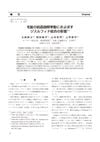 2 citations,
March 2021 in “bioRxiv (Cold Spring Harbor Laboratory)”
2 citations,
March 2021 in “bioRxiv (Cold Spring Harbor Laboratory)” Hairless mammals have genetic changes in both their protein-coding and regulatory sequences related to hair.
 2 citations,
August 2020 in “Scientific reports”
2 citations,
August 2020 in “Scientific reports” Genes related to keratin, skin cell differentiation, and immune functions are key in hedgehog skin and spine development.
 2 citations,
May 2020 in “Journal of visualized experiments”
2 citations,
May 2020 in “Journal of visualized experiments” Controlled light treatment in mouse skin speeds up healing and hair growth.
 2 citations,
July 2019 in “Journal of psychology & clinical psychiatry”
2 citations,
July 2019 in “Journal of psychology & clinical psychiatry” Zinc helps reduce the severity of depression.
 2 citations,
March 2019 in “European Journal of Dermatology”
2 citations,
March 2019 in “European Journal of Dermatology” Pharmacy-sold shampoos tend to have fewer allergens compared to those sold in other stores.
 2 citations,
July 2018 in “Elsevier eBooks”
2 citations,
July 2018 in “Elsevier eBooks” Some supplements may help with hair loss, but there's not enough strong evidence to recommend them without doctor advice.
 2 citations,
January 1997 in “Principles of Medical Biology”
2 citations,
January 1997 in “Principles of Medical Biology” Drug metabolism affects how long a drug works, its interactions, activation, and toxicity, and is influenced by genetics, diet, illness, and other drugs.
 1 citations,
January 2024 in “Theranostics”
1 citations,
January 2024 in “Theranostics” Exosomes show promise for future tissue regeneration.
 1 citations,
July 2023 in “Nature communications”
1 citations,
July 2023 in “Nature communications” MOF controls key genes for skin development by regulating mitochondrial and ciliary functions.
 1 citations,
March 2023 in “PloS one”
1 citations,
March 2023 in “PloS one” Different amounts of daylight affect cashmere growth in goats by changing the activity of certain genes and molecules.
 1 citations,
December 2022 in “Middle East Journal of Science”
1 citations,
December 2022 in “Middle East Journal of Science” Permanent hair dyes use chemicals that react with hydrogen peroxide to create color.
 1 citations,
January 2021 in “Dermatologic Therapy”
1 citations,
January 2021 in “Dermatologic Therapy” Trichobiolight effectively treats hair loss with 82.5% success.
 1 citations,
January 2019 in “Elsevier eBooks”
1 citations,
January 2019 in “Elsevier eBooks” Electrospun matrices help regenerate skin and hair follicles using PCL and collagen scaffolds.
 1 citations,
January 2019 in “Elsevier eBooks”
1 citations,
January 2019 in “Elsevier eBooks” New scaffold materials help heal severe skin wounds and improve skin regeneration.
 1 citations,
August 2018 in “bioRxiv (Cold Spring Harbor Laboratory)”
1 citations,
August 2018 in “bioRxiv (Cold Spring Harbor Laboratory)” A new mutation in the TMEM173 gene and a risk allele in IFIH1 cause a unique set of immune-related symptoms.
![Integrating Multi-Omics Analyses of Nonomuraea Dietziae to Reveal the Role of Soybean Oil in [(4′-OH)MeLeu]4-CsA Overproduction](/images/research/0eba9759-3aa4-4a06-a70a-2d9c46be53f3/small/23018.jpg) 1 citations,
July 2017 in “Microbial Cell Factories”
1 citations,
July 2017 in “Microbial Cell Factories” Adding soybean oil to Nonomuraea dietziae increases production of a beneficial compound by improving metabolism and enzyme systems.

research Hair
1 citations,
January 2016 in “Springer briefs in molecular science” The document suggests using safer, plant-based hair products instead of harmful synthetic ones.
 1 citations,
January 2015 in “Hair therapy & transplantation”
1 citations,
January 2015 in “Hair therapy & transplantation” Some supplements and hormones can increase hair loss by raising DHT levels.
 1 citations,
January 2015 in “Journal of clinical and investigative dermatology”
1 citations,
January 2015 in “Journal of clinical and investigative dermatology” IGF-1 from human placenta helps hair grow.
 1 citations,
January 2013 in “Chronicles of young scientists”
1 citations,
January 2013 in “Chronicles of young scientists” Immuno-cosmeceuticals from chicken egg yolk can effectively repair and improve damaged hair.
 1 citations,
January 2013 in “Springer eBooks”
1 citations,
January 2013 in “Springer eBooks” Cosmeceuticals may benefit skin health but need more research for efficacy and safety confirmation.
 1 citations,
January 2010 in “Springer eBooks”
1 citations,
January 2010 in “Springer eBooks” Certain micronutrients may improve hair and nail health, but more research is needed to confirm their benefits.
 1 citations,
January 2009 in “Journal of S C C J”
1 citations,
January 2009 in “Journal of S C C J” Changing disulfide bonds in human hair affects its melting behavior and thermal stability.

Monocyclic aromatic compounds are important for developing various drugs and treatments.
 January 2025 in “Frontiers in Immunology”
January 2025 in “Frontiers in Immunology” IVIG therapy significantly improved symptoms in a patient with APS-2 and SPS.
December 2024 in “International Journal of Scientific Reports” The plant-based hair serum is a promising and safe alternative to minoxidil for hair regrowth.
 November 2024 in “Journal of Scientific Agriculture”
November 2024 in “Journal of Scientific Agriculture” Silk proteins are great for cosmetics because they protect and improve skin and hair while being eco-friendly.
 August 2024 in “Life Science Alliance”
August 2024 in “Life Science Alliance” Helminth protein helps wounds heal better by reducing scarring and promoting tissue growth.

Blocking the Mitochondrial Pyruvate Carrier causes stress in hair follicles, which can be reduced by an ISR inhibitor.
 June 2024 in “International Journal of Advanced Research in Science Communication and Technology”
June 2024 in “International Journal of Advanced Research in Science Communication and Technology” Herbal extracts like Ficus religiosa may help with hair growth and skin rejuvenation.
















![Integrating Multi-Omics Analyses of Nonomuraea Dietziae to Reveal the Role of Soybean Oil in [(4′-OH)MeLeu]4-CsA Overproduction](/images/research/0eba9759-3aa4-4a06-a70a-2d9c46be53f3/small/23018.jpg)












